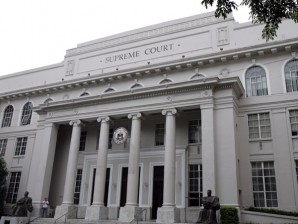SC declares state of emergency in Sulu unconstitutional

The Supreme Court building in Manila. INQUIRER FILE PHOTO
MANILA, Philippines—The Supreme Court has declared as unconstitutional the state of emergency in Sulu declared by its governor in 2009, at the height of the kidnapping of three members of the International Committee of the Red Cross (ICRC). The state of emergency is supposed to be still in effect to this day.
In a decision dated July 3, 2012, but released to the media only on Wednesday, or 15 days after its promulgation, the high court, through Associate Justice Maria Lourdes Sereno, said that only the President of the Philippines is vested with emergency powers under the Constitution.
Moreover, the high court added that only the President, under the Constitution, has the power to call the military and the police to respond to a state of emergency.
“Respondent provincial governor is not endowed with the power to call upon the armed forces at his own bidding. In issuing the assailed proclamation, Governor (Abdusakur) Tan exceeded his authority when he declared a state of emergency and called upon the Armed Forces, the police and his own Civilian Emergency Force,” the high court said.
On Jan. 15, 2009, ICRC volunteers Andreas Notter, a Swiss national and head of the ICRC based on Zamboanga City; Eugenio Vagni, an Italian national; and Marie Jean Lacaba, a Filipino engineer, were abducted by armed men belonging to the Abu Sayyaf Group (ASG). The ASG demanded money for the release of the captives for “board and lodging” expenses. All three captives were later released.
Article continues after this advertisementAt the height of the kidnapping, Tan declared a state of emergency in pursuant to Republic Act (RA) No. 9372 (Human Security Act) and citing Sec. 465 of RA No. 7160 (Local Government Code of 1991) “which bestows on the Provincial Governor the power to carry out emergency measures during man-made and natural disasters and calamities, and to call upon the appropriate national law enforcement agencies to suppress disorder and lawless violence.”
Article continues after this advertisementTan called upon the PNP and the Civilian Emergency Force (CEF) to conduct arrests and general searches, set up checkpoints, and other actions “necessary to ensure public safety.” A set of guidelines was also released for the implementation of the proclamation.
But the high court said “calling out powers contemplated under the Constitution is exclusive to the President. An exercise by another official, even if he is the local chief executive, is ultra vires (beyond the power) and may not be justified by invoking the Local Government Code.”
The high court ordered Tan and co-respondents Lieutenant General Juancho Saban, Brigadier General Eugenio Clemen and Police Superintendent Bienvenido Latag to desist from further implementing the subject proclamation. One of the respondents in the case, P/Supt. Julasirim Kasim, died in the line of duty.